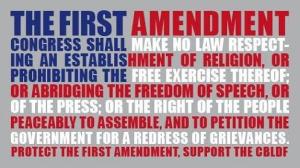Federal Court Upholds School Punishment for “Online Bullying”
Posted by WV Politics
 A three-judge panel of the 4th U.S. Circuit Court of Appeals ruled Wednesday that Musselman High School and Berkeley County Schools acted within its authority when it suspended a student, Kara Kowalski, for creating a MySpace page which contained insults about another student. Even though the internet postings were made off-campus, the courts ruled that the speech was within the school’s jurisdiction because it was disruptive to the educational process at the school and that it interfered with the “rights of other students to be secure and to be let alone.”
A three-judge panel of the 4th U.S. Circuit Court of Appeals ruled Wednesday that Musselman High School and Berkeley County Schools acted within its authority when it suspended a student, Kara Kowalski, for creating a MySpace page which contained insults about another student. Even though the internet postings were made off-campus, the courts ruled that the speech was within the school’s jurisdiction because it was disruptive to the educational process at the school and that it interfered with the “rights of other students to be secure and to be let alone.”
Kowalski created a group on MySpace called “S.A.S.H.”, which she claimed stood for “Students Against Sluts Herpes” and was not targeted towards any specific student. She was suspended from school and removed from the cheerleading team when the targeted students’ parents made the school aware of the situation and the principal determined that the group was a “hate website”.
The court decision was based on the landmark case Tinker vs. Des Moines Independent Community School District. Under Tinker, “public schools have a compelling interest in regulating speech that interferes with or disrupts the work and discipline of the school”. Judge Paul Neimeyer, wrote in his majority decision that “we are confident that Kowalski’s speech caused the interference and disruption described in Tinker as being immune to the First Amendment,” he also claimed that “To be sure, a court could determine that speech originating outside of the schoolhouse gate but directed at persons in the school and received by and acted on by them was in fact in-school speech.” Niemeyer even went further, suggesting that schools could punish online speech simply because it was lewd or offensive.
Tinker vs. Des Moines was decided in 1969 and focused on students who wore black armbands to school in protest of the Vietnam War. In fact, the court decided in 1969 that the students in the case were constitutionally protected under the 1st Amendment and that “It can hardly be argued that either students or teachers shed their constitutional rights to freedom of speech or expression at the schoolhouse gate.” However, the majority opinion stated that the school could prohibit speech that “materially and substantially interfere with the requirements of appropriate discipline in the operation of the school.” It could not, though, prohibit speech simply in “desire to avoid the discomfort and unpleasantness that always accompany an unpopular viewpoint.”
Kowalski’s attorneys still have an opportunity to ask the full 4th Circuit to rehear the case and/or to petition it to the US Supreme Court.
Unless the decision is overturned by a higher court, it is legal precedent in Maryland, North Carolina, South Carolina, Virginia and West Virginia.
The full court decision can be read here.
Rate this:
Share this:
- Click to share on Facebook (Opens in new window)
- Click to share on Twitter (Opens in new window)
- Click to email a link to a friend (Opens in new window)
- Click to share on Reddit (Opens in new window)
- Click to print (Opens in new window)
- Click to share on LinkedIn (Opens in new window)
- Click to share on Tumblr (Opens in new window)
- Click to share on Pinterest (Opens in new window)
Related
Posted on July 29, 2011, in Judicial, News and tagged 1st, amendment, court, first, online bullying, Rights, school, speech, West Virginia. Bookmark the permalink. Leave a comment.

Leave a comment
Comments 0